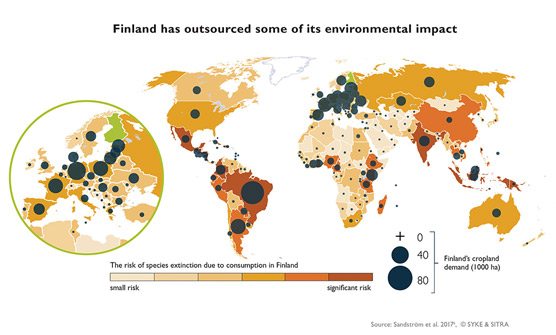Earth system changes can be depicted and understood by examining different feedbacks and boundaries. Processes affecting global and local ecosystems are closely interlinked and they also need to be examined together.
For example land use change causes biodiversity loss and worsens climate change. Clearing forests for agriculture reduces biodiversity in the area that is cleared. Clearing also affects rainfall, resulting from changes in water vapour transfer into the atmosphere, and consequently the availability of fresh water both locally and far away from the cleared area.
Even good intentions can have harmful results. For example the strong growth in the use of biofuels as a way of mitigating climate change can lead to deforestation, reduction in biodiversity, and an increase in the use of fresh water.
Feedback processes and interactions of different phenomena need to be considered when thinking about solutions. Otherwise there is a risk of shifting problems or unwittingly reinforcing them.
Through international trade Finland has outsourced a large portion of its production and related environmental impacts to other countries. The picture below demonstrates the global impacts of Finnish consumption. About 40 percent of agricultural land needed for the production of agricultural products consumed by Finns lies outside of Finland, primarily in other parts of Europe and in South America. This includes, for example, imported food, coffee, and soybeans.

Picture Cropland area required around the world by Finnish food consumption. Clearing forest for agricultural use leads to the risk of global species loss especially in tropical countries. For example, areas where coffee and cocoa are grown have many endemic species that are susceptible to extinction. Source: Sandström et al. 2017. © SYKE & SITRA
Effects come back to Finland
Agriculture in many parts of Africa, for example, will suffer from drought caused by overstepping global boundaries. The global impact will also come back in the form of negative effects on Finland. Climate change causes refugee flows, which can also target Finland. The culmination of inequality and poverty increases conflicts, extremist thinking, and wars.
Extreme weather phenomena will become more common also in Finland. This reduces possibilities for societal anticipation. Finnish nature will be harmed. For instance, the reduction in insect and bird populations is a sign of decreased natural diversity.
An uncontrolled climate change and biodiversity decline will lead to decreased prerequisites for well-being. Food production is ultimately dependent on how well ecosystems function. Climate change and the decline in natural diversity weaken global and local ecosystems. For example, worse droughts increase the prices of food and the mass deaths of pollinators weaken crop yields.
Seeking only short-term gains in the economy without regard to climate change or biodiversity loss will endanger economic development in the long run.